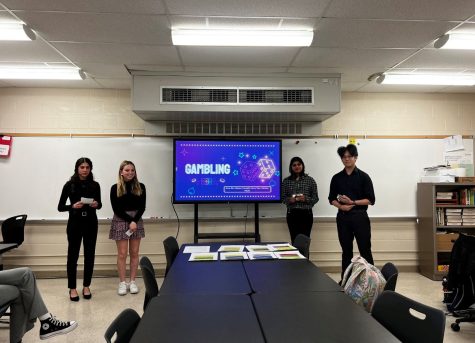Humanities majors devalued

(Al Seib/Los Angeles Times/TNS).
Nereyda R. Arenas, center, talks about a book she has read with other mothers at the Bravo Medical Magnet High School literature club on Monday, Feb. 22, 2016
May 4, 2016
Graduation: It’s one of the most enhancing and transitional periods in any teen’s life. The culmination of four years of hard work has led up to crossing a stage into a new chapter, better known as college. Some will become lawyers, some will study for medical majors, and some will have a knack for numbers.
But what about the book-readers? What about the review-writers? What about students with the creative thought process worthy of a humanities major?
They’ll study hard in the subject that they’re best at and they’ll be rewarded with an average to low amount of income, especially compared to students in the medical or business field.
According to popular newspapers such as The New York Times and The Wall Street Journal, humanities majors have become increasingly devalued by the culture and society around them and they have their paychecks to prove it.
Doctors and lawyers are the ideal careers and not only because they make the most money. They are the most valued members amongst our communities. Doctors have the knowledge to cure sickness and mend broken bones while lawyers possess the ability to clear up sticky situations for almost anyone.
Exhibiting this is the statistics brought up by the PayScale website that the average salary for doctors is $209,954 and the average salary for lawyers is $140,470. The average salary for a humanities major, however, is approximately $64,955.
Comparatively, the income of a humanities major still appears drastically low compared to that of a medical or business major. In an article by Susan Adams on the Forbes magazine website, she wrote, “Majoring in the humanities seems like a bad idea these days. Employers don’t want to hire you, we hear, and when they do, they pay poorly.”
But a humanities major seemingly brings nothing to the table, especially alongside a doctor or a lawyer. They do not cure bronchitis or speak on your part in a court case. All they have is the language that they represent through their writings, teachings, and interpretations.
Or do they?
What many people fail or refuse to acknowledge are valuable aspects that good writing and analysis bring to the community around it. I strongly believe that a creative thought process evokes emotions and feelings that truly benefit its audience by bringing out the best in any person, and I’m not the only one.
Amy Meade, an English teacher at Mayfield High School, believes that humanities majors are interconnected with other majors. “Humanities is so essential to understanding ourselves and when we understand ourselves we can become better doctors; we can become better businessmen and women,” said Meade.
Gary Gutting of The New York Times also observed the amazing ideology of humanities majors. He wrote, “The point of work should not be just to provide the material goods we need to survive. Since work typically takes the largest part of our time, it should also be an important part of what gives our life meaning.”
Barbara Ancell, a science teacher at Mayfield High School, thinks that humanities majors contribute a lot to the world around them. She said, “Both of my parents had liberal arts educations and always pushed a liberal arts education because they felt that [the field] broadened you as a human being. I think it makes society better, just no doubt about it, having that liberal arts [experience] and being an avid reader, because you just don’t know everything.”
Adams revealed a ray of hope for young writers everywhere when she said, “By the time [humanities majors] are 56-60 years old, considered their peak earning years, they make an average of $66,000, which is $2,000 a year more than those with professional degrees.”
Adams remains on the positive side of the topic, including a comparison of humanities careers with a marathon as opposed to a sprint. Nevertheless, humanities majors earn an income drastically lower than that of an medical or business major.
Many intellectuals recognize the importance and future benefits of becoming a humanities major. But unless the whole of society around us recognizes it too, the pay of humanities majors just isn’t going to increase. In the words of the Lorax, “Unless someone like you cares a whole awful lot, nothing is going to get better. It’s not.”















![Russian president Vladimir Putin took action to invade Ukraine on Feb. 24. According to the PBS Frontline episode Putins Revenge, Putin is obsessed with his image and how he and his countrys actions are portrayed. The Atlantics Julia Ioffe said, [Putin] watches tapes of the evening news over and over and over again to see how he’s portrayed, to see how he looks.](https://pawprintnews.org/wp-content/uploads/2022/04/putin-5277284_1920-900x596.jpg)












































![Russian president Vladimir Putin took action to invade Ukraine on Feb. 24. According to the PBS Frontline episode Putins Revenge, Putin is obsessed with his image and how he and his countrys actions are portrayed. The Atlantics Julia Ioffe said, [Putin] watches tapes of the evening news over and over and over again to see how he’s portrayed, to see how he looks.](https://pawprintnews.org/wp-content/uploads/2022/04/putin-5277284_1920-475x315.jpg)




